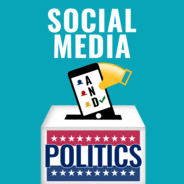Arjun Moorthy, co-founder and CEO of The Factual, discusses how machine learning and natural language processing can rank news for credibility. Arjun breaks down the criteria underpinning The Factual's rating system as well as how it tries to minimize bias. We talk about some of the pitfalls of optimizing news for engagement, as well as how anonymity in a different incentive structure affects discourse around discussing news. Towards the end of the episode, we discuss the current state of AI in the newsroom, and how automation might affect news consumption in the future. Check out the Unbiased Podcast!And test out The Factual's engine at IsThisCredible.com

Politik
Social Media and Politics Folgen
Social Media and Politics is a podcast bringing you innovative, first-hand insights into how social media is changing the political game. Subscribe for interviews and analysis with politicians, academics, and leading digital strategists to get their take on how social media influences the ways we engage with politics and democracy. Social Media and Politics is hosted by Michael Bossetta, political scientist at Lund University. Check out the podcast's official website: https://socialmediaandpolitics.org.
Folgen von Social Media and Politics
185 Folgen
-
Folge vom 17.04.2022Rating News Credibility with Algorithms, with Arjun Moorthy
-
Folge vom 27.03.2022Social Media and the War in Ukraine, with Prof. Joshua TuckerProf. Joshua Tucker, Professor of Politics at NYU and Co-Director of the Center for Social Media and Politics, discusses social media's impact on the invasion of Ukraine. We talk about 'information theaters' of operation and how they differ across the West, Ukraine, Russia, and China. Prof. Tucker also shares his thoughts on Volodymyr Zelensky's teleconferencing, the Biden administration's pre-bunking strategy towards disinformation, multinational corporations' actions towards sanctions, and Vladimir Putin's isolation. And more! Here are links to prior episodes on Ukraine:Volodymyr Zelensky's Social Media Strategy in the 2019 Ukraine ElectionsRussian Disinformation and Social Media in Ukraine
-
Folge vom 27.02.2022Political Leader Evaluations on Instagram and Emotions in Covid Crisis Communication, with Dr. Jenny LindholmDr. Jenny Lindholm, University Teacher and Researcher in Political Science, Media, and Communication at Åbo Akademi University, discusses her research on visual political communication. First, we break down Dr. Lindholm's eye-tracking experiment on how party leaders' Instagram photos affect viewers' trait perceptions of leaders. The focus is on where viewers of these images give their visual attention, and whether that differs across public versus private photos as well as the gender of party leaders. Then, we discuss another study focusing on the emotion communication of the Finnish Prime Minister during coronavirus crisis communication in press conferences. Here are the two studies we discuss in the episode:See Me, Like Me! Exploring Viewers’ Visual Attention to and Trait Perceptions of Party Leaders on Instagram (2021)Emotionell räddning? Visuell kriskommunikation under coronakrisens inledande skede – fallet Finland (2021)
-
Folge vom 13.02.2022Mobile News Consumption: How Smartphone News Exposure Affects Political Knowledge, with Dr. Jakob OhmeDr. Jakob Ohme, Senior Researcher at the Weizenbaum Institute, discusses his research on mobile news consumption. Dr. Ohme breaks down how exposure to political news on a smartphone might differ from a desktop, and he breaks down results from a recent eye-tracking study exploring the topic. We also discuss how smartphones can be used for data collection, through Dr. Ohme's research using a smartphone media diary as well as data from the iOS Screen Time function. The studies discussed in the episode are: Mobile News Learning: Investigating Political Knowledge Gains in a Social Media Newsfeed with Mobile Eye Tracking (2021)Mobile Data Donations: Assessing Self-report Accuracy and Sample Biases with the iOS Screen Time Function (2020)Mobile but Not Mobilized? Differential Gains from Mobile News Consumption for Citizens’ Political Knowledge and Campaign Participation (2020)
